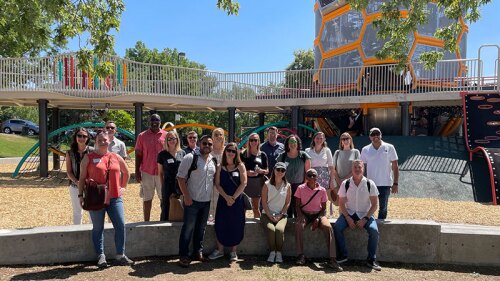Weighing racial disparities in the commercial real estate industry.
The Urban Land Institute’s Houston district council is among a group of five ULI district councils has been working to examine local histories of racial discrimination in land use and transportation, to draw connections with current health equity disparities, and to chart a course towards a more equitable future for the real estate industry. The project, ULI District Council Partnerships for Health Equity, is supported by the ULI Building Healthy Places Initiative with financial support from the Robert Wood Johnson Foundation.
The cohort of participating district councils includes ULI Houston, ULI St. Louis, ULI British Columbia, ULI Northwest, and ULI Toronto. The project launched last year, following an open call for interest from North American district councils. The district councils are working in partnership with other organizations locally to understand historic inequities and racial discrimination in land use, and to craft creative strategies to address the ongoing impacts of these policies on community health and wealth disparities. These action agendas for change in real estate will emphasize tangible steps for real estate, in addition to broader policy recommendations.
The ULI Building Healthy Places Initiative works to make health and social equity mainstream considerations in real estate practice. According to William Herbig, senior director of the ULI Building Healthy Places Initiative, “The two main factors driving this reckoning within the industry and within ULI include the disproportionate impact of COVID-19 on communities of color and those of low income; and the rise of the racial justice movement as a result of the brutal murder of George Floyd.
“ULI, as an organization, has committed to doing more,” Herbig says. “Our profession has been part of the problem. We have the ability and the responsibility to address racial inequity going forward. But we cannot go at it alone. Finding solutions requires building new bridges of trust and cooperation beyond our network of members.”
That the district council teams are geographically diverse was intentional. And this marks the first time a Building Healthy Places program has been able to fund councils in Canada. “The systemic racial issues are different in the U.S. versus Canada, and there’ve been robust listening and learning opportunities amongst the two Canadian teams and the U.S. teams to better understand nuances involved in Black and Indigenous experiences and differences in the two countries,” Herbig says Each district council has identified chairs and a leadership group for the effort.
The aim of this program is to “address these systemic issues,” Herbig says. To do so, the ULI district councils are reaching beyond their established local networks, forging new relationships, learning about local histories, and working to drive fundamental industry change.
Fostering an Equitable Vision with Settegast
Carolyn Rivera has lived in Settegast, part of Northeast Houston, for more than 40 years. She can recall the days when the “streets were passable” and the neighborhood was “beautiful” and “green,” but that is not how she would describe Settegast today. As a community ambassador for ULI Houston’s project, she is grateful that the team is focusing on improving her neighborhood.
“I’m glad that ULI is here, because that will make more noise, and that can eventually get the job done,” Rivera said.
The “job” is co-creating an action agenda for healthy community development in Settegast with residents and other stakeholders. The action agenda will include steps that residents, ULI members, local organizations, and local government can take to address community needs and work towards a collective vision of a healthy, opportunity-rich Settegast.
Initial steps to achieve this vision require addressing basic needs. Rivera and other Settegast residents have concerns about large swaths of vacant lots, illegal dumping, and drainage ditches that are not maintained.
Jessica Fuentes, another community ambassador, also describes the area’s lack of resources, with neighbors having to drive long distances to shop at a major grocery chain.
“It is a health problem for the community,” Rivera says.
Kyle Maronie, a current resident and the community engagement and empowerment manager for the Harris County Public Health Community Health and Violence Prevention Division is helping to connect his neighbors with the project’s core team. Maronie grew up in Settegast and purchased a home next door to his parents because of his commitment to see the neighborhood thrive for future generations and to help transform the narrative of the neighborhood.
“I don’t think folks are asking for anything that’s unreasonable.” says Maronie. “It’s the basic amenities that any community, anywhere, would want, including walkable streets, stopping illegal dumping. Just baseline development in the community would be transformative.”
The project, a partnership between ULI Houston, Harris County Public Health, Houston Land Bank, and The Kinder Institute for Urban Research is focusing on ways developers and organizations can address local concerns. The project team has collected extensive data from existing sources and new data from residents to provide actionable recommendations to key decision makers.
The goal is to thoughtfully engage with residents and developers to ensure residents can benefit from development without displacement.








